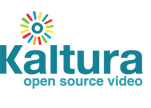We can no longer imagine the internet without video content, and yet it’s still a tricky medium for many. Different formats, large file sizes and the variety of operating systems and devices can make the use of video on the web difficult.
Israeli company Kaltura, which has recently raised $25 million, provides an open source video code that allows its customers to easily manage their videos, including uploading, streaming and editing, as well as analyze and monetize the content. Some of Kaltura’s many partners include Wikipedia and Google and customers include leading universities and media companies.
Related articles
- ‘Extreme Reality’ Body Recognition Is Trying To Outdo PrimeSense
- Vidoco: Turn Your Life Into A Documentary
“Our system is built like a butterfly,” Kaltura’s CRO Dr. Shay David tells NoCamels, “the first wing receives all the different resources of video that go into the system, which we then normalize trough an injection process,” says David. Baiscally, the system identifies which type of video input it receives and processes it in a way that enables different types of videos to be displayed through the same output method. The “body” of the butterfly is where Kaltura handles the various details involving the use of video online: copyright, information control, Quality Assurance, analytics system, moderation systems, etc.
“The second wing is our distribution capability. The content is now ready for use and could be seen, for example, as a video player on the customer website or as a list of video feeds,” says David. He adds: “No end user would face a problem running the customer’s videos. We know how to transfer any kind of content, from any kind of device to any kind of device.”
[youtuber youtube=’http://www.youtube.com/watch?v=81XmhlLJhFg’]
Partnering with Google and Wikipedia
Kaltura, founded in 2006, has an impressive track record, with Wikipedia and Google as partners. “Wikipedia were pretty strict,” says David, “we provided our open video source as the infrastructures for the video on their web, while they wanted not only open source code but also an open source video format.”
David explains that providing that format was impossible – but then Google got in the mix: “It took few years until Google took part. They bought the company On2 in 2010, which helped them to develop the open video format ‘Webm’. Wikipedia was then able to provide both our open video source and Google’s new open video format.”
Sign up for our free weekly newsletter
Subscribe“Google promised that the video format would stay open forever, making the cooperation between the three of us possible,” says David. “The cooperation helped us to place Kaltura as a leading player in the world of video content. We don’t charge Wikipedia for using our open code and this is our way to contribute to the global video developer’s community,” he says. “Thanks to websites like Wikipedia, we have more than a billion streams a month and more than 100 million viewers,” concludes David.
Big in America, eyeing Asia
 Kaltura has over 150 customers. Most of the company’s activity (70 percent) is in the North American market and Kaltura’s main markets are spread vertically in three industrial sectors. Some of the biggest organizations in the world use Kaltura’s service, including Walt Disney and Paramount Pictures in the media sector, NYU, Yale and Cornell in the education sector and Ikea, Groupon and BestBuy in the enterprise sector.
Kaltura has over 150 customers. Most of the company’s activity (70 percent) is in the North American market and Kaltura’s main markets are spread vertically in three industrial sectors. Some of the biggest organizations in the world use Kaltura’s service, including Walt Disney and Paramount Pictures in the media sector, NYU, Yale and Cornell in the education sector and Ikea, Groupon and BestBuy in the enterprise sector.
According to David, the system is used by more than 500 universities in the world, including nine out of the top 10 universities in the US. “The education sector includes universities who want to ‘create their own YouTube’ and [want to] have the ability to teach their students remotely. We predict there will be great growth in this sector,” says David.
The company’s business model is mainly software licensing and could be divided into two: Software as a Service (SaaS), which includes the open platform and applications for the video management and hosting on Kaltura’s servers, or SaaS without hosting.
In November of 2012, Kaltura raised $25 million in a series D financing round. David says that the funds will be directed towards expansion into the Asian-Pacific region and targeting new markets, such as defense and healthcare.
The company is headed by Ron Yekutiel (CEO), Dr. Michal Tsur (President & CMO), Dr. Shay David (CRO) and Eran Etam (Deputy R&D General Manager).
Photo by Kaltura
Related posts

Editors’ & Readers’ Choice: 10 Favorite NoCamels Articles

Forward Facing: What Does The Future Hold For Israeli High-Tech?

Impact Innovation: Israeli Startups That Could Shape Our Future




Facebook comments